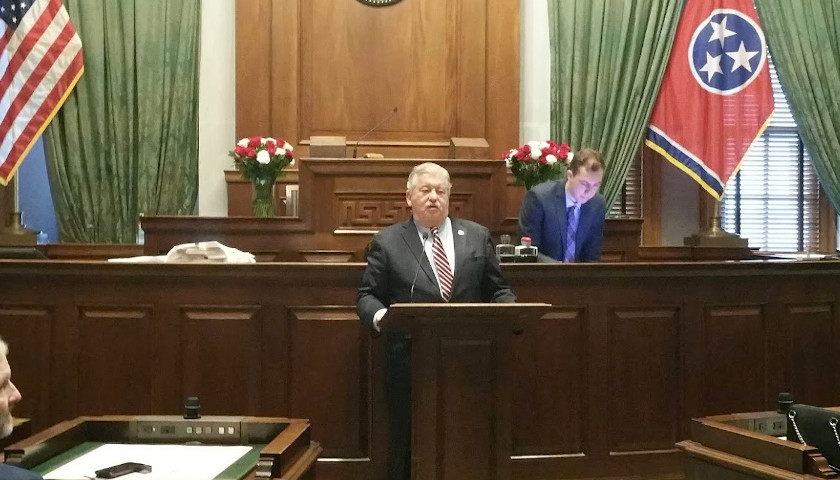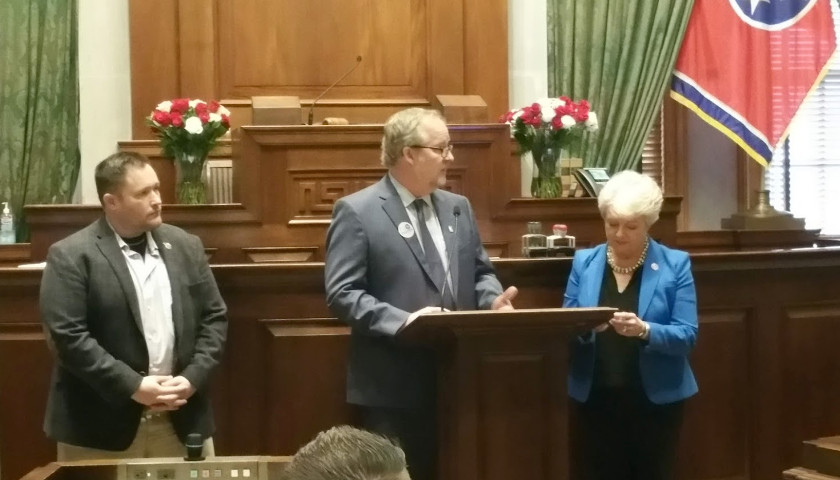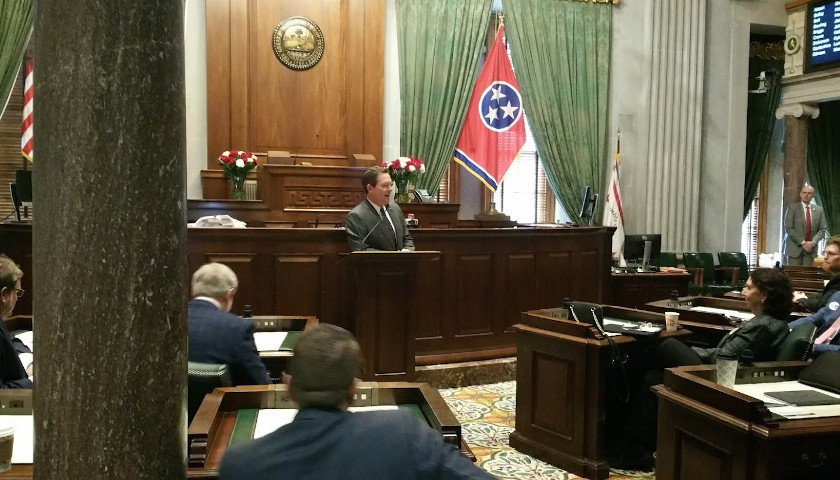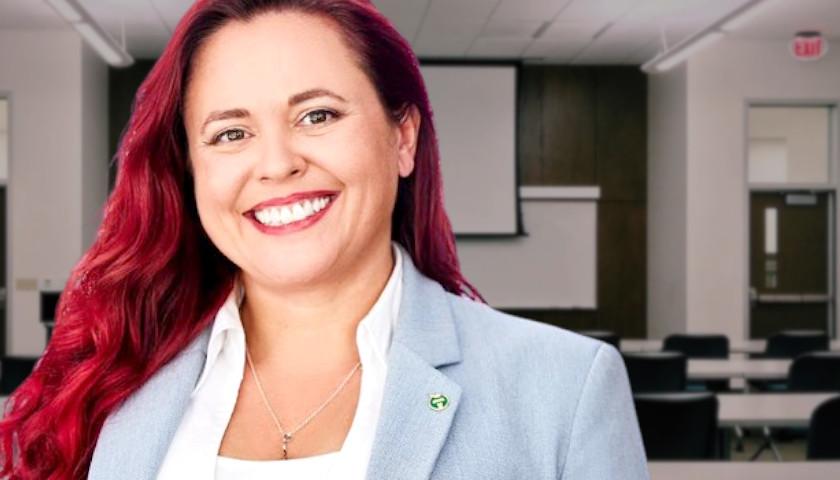NASHVILLE, Tennessee – Eight groups partnered together Tuesday for a “No Tax on my Occupation” lobby day at the Tennessee state legislature.
The groups – including NFIB (National Federation of Independent Business) Tennessee, Americans for Prosperity, Beacon Impact, NAIFA (National Association of Insurance and Financial Advisors) Tennessee, TMA (Tennessee Medical Association), Americans for Tax Reform, Tennessee Bar Association and TLA (Tennessee Lobbyists Association) – at first glance, may not appear to have anything in common.

Their common interest, however, is the full elimination of Tennessee’s professional privilege tax.
The professional privilege tax is a $400 tax for the “privilege” of certain professionals to run a business in the state.
The tax had been imposed on 22 professions until 2019, when it was eliminated for 15 occupations. The tax remains, however, on seven professions including attorneys, physicians and osteopathic physicians, financial advisers and lobbyists.
The organizations representing the taxed professionals hold the position that that it’s a right and not a privilege to run a business in Tennessee.
They also say that the professional privilege tax is a double tax, as the professionals already pay licensing fees and a business tax. The rigid, burdensome tax must be paid no matter how frequently the professional practices or whether they primarily offer charity services.
With more than 100 professions in Tennessee, only seven of which pay the tax, the professional privilege tax is arbitrary, the groups say.
Additionally, only six other states assess a similar type of tax, but Tennessee’s $400 annual tax is essentially the highest in the nation.
The lobby day, after coffee and donuts were provided in the Legislative Lounge in the Capitol Building, got started in the Senate chambers across the hall.

NFIB Tennessee State Director Jim Brown told the two dozen or so participants that Governor Bill Lee “got it right” by including in his State of the State Address a reduction of $200 in the professional privilege tax on the remaining seven professions.
Brown expressed appreciation, since it was the only tax cut included in Governor Lee’s 2020-2021 budget.
As Brown gave his introduction, invited speakers Lt. Governor and Senate Speaker Randy McNally, House Speaker Cameron Sexton, Senator Janice Bowling and Representative Micah Van Huss along with Representative Chris Todd entered the chamber.
Speaker Cameron Sexton (R-Crossville) started his comments to the group by giving some insights as to his long history with Lt. Governor Randy McNally (R-Oak Ridge) going back to the latter’s 1994 political campaign.
Now serving alongside Lt. Governor McNally as Speaker, Sexton said, “is a wonderful experience.”
Of the professional privilege tax, Speaker Sexton said they made a big investment to reduce it last year and this year another “slice” will be made at it, reducing the $80 million in revenues from it down to $40 million.
Speaker Sexton said they look forward to repealing the professional privilege tax, like the death tax and the Hall income tax.
The General Assembly has been very active over the past decade, said Speaker Sexton, to save money and put it in the rainy day fund or give it back to Tennesseans.
He added that there needs to be a discussion on the state’s franchise and excise tax, “to see if we’re too high on that.”
The franchise and excise (F&E) tax is Tennessee’s second highest revenue generator, after the sales tax. Five months into the 2019-2020 fiscal year and after the cuts made during as part of the gas-tax increasing IMPROVE Act, the F&E tax is $152 million or nearly 18 percent of the budgeted estimates.
In leading up to the introduction of Lt. Governor McNally, Speaker Sexton said that McNally was the central figure in Tennessee that stood up against corruption in the 1990’s, when others were taking bribes. For that, Speaker Sexton said, “We owe him a debt of gratitude.”
NFIB’s Brown also said that they wouldn’t be there had it not been for Lt. Governor McNally, because he was the one who put the professional privilege tax on the table last year, when the House wanted the Katie Beckett waiver.
After giving credit to Sexton for his successful campaign, contrasting the House as “junior high” and the Senate as a “nursing home,” and a brief review of how bills from both chambers eventually come together, Lt. Governor McNally said there will be as many as 3,000 total bills filed in the two-years of the 111th General Assembly.
As to the $40 billion in spending, Lt. Governor McNally said one-third is for TennCare – two-thirds of which comes from the federal government – and the remainder goes to education, transportation, corrections and other departments.
For a bill to pass in the Senate, 17 votes are required, while 50 are required in the House, explained McNally.
When it gets to his desk, the governor could choose veto a bill and also has line-item veto authority on the budget, although no governor has done so in Lt. Governor McNally’s time in the Tennessee General Assembly.
The only bill that the General Assembly must pass is the appropriations bill, which Lt. Governor McNally said, “Doesn’t get a lot of press.”
Other bills that will come before lawmakers is the 12-week leave act, said Lt. Governor McNally. He was alluding to the proposal by Governor Lee for a new state employee benefit of 12 weeks paid leave per 12-month period for Family Medical Leave Act qualifying life events.
Then the Lt. Governor took an unexpected and playful turn with the participants, who were sitting in the desks of the state senators, by running through the voting process on three mock bills.
The first to be set up by the clerk – SB 1 by McNally – was for the 12-week paid leave proposal. Lt. Governor McNally quickly replied to seeing the “bill” on the vote board, “I don’t want to sponsor that bill.”
The “vote” resulted in 15 Ayes, 8 Nos and 4 Present and Not Voting. Lt. Governor McNally said the measure, not reaching a 17-vote constitutional majority, had “failed.”
A quick background on the Education Savings Accounts to provide school choice in Davidson and Shelby counties where the majority of Tennessee’s failing schools are located, was given by the Lt. Governor. With a proposal to delete the pilot program, Lt. Governor McNally’s summary was followed by a vote on whether the program should continue. That measure “passed” with a 24-1-1 vote.
The third mock vote, hitting a little closer to home for the participants, was for full repeal of the $400 professional privilege tax via an amendment to the proposed reduction of $200. Of course, that measure “passed” overwhelmingly, with some participants going so far as to vote at vacant desks.
While the exercise was all in good fun, it may have also provided Lt. Governor McNally with an indication of public sentiment on some of the proposed bills lawmakers will be considering this legislative session.
The Lt. Governor offered a degree of optimism to the attendees that, if revenues are available, the professional privilege tax may be fully abolished, not just reduced from $400 to $200.
As NFIB’s Brown transitioned from Lt. Governor McNally to Representative Micah Van Huss (R-Jonesborough) and Senator Janice Bowling (R-Tullahoma), he told the group that the Lt. Governor’s words were encouraging.
Representative Van Huss kept his comments brief, saying that the professional privilege tax is unfair and that he looks forward to making further cuts from last year.
Senator Bowling said she feels that the professional privilege tax is worse than an income tax in that it is pre-emptive, being paid in anticipation of performing work and that it is unjust, arbitrary and capricious.
Alluding to the theory of President Ronald Reagan’s economic advisor Art Laffer – the Laffer curve – which essentially says that there is an ideal tax rate that maximizes tax revenues, Senator Bowling said she believes in it.
In fact, even though the professional privilege tax was removed from 15 professions last year, those revenues are up $21 million or 15 percent over the budgeted estimates for the first five months of the current fiscal year.
With regard to consideration of keeping the tax in place for out-of-state financial advisers, Lt. Governor McNally questioned the constitutionality of it and Senator Bowling said they pride themselves on being moral and ethical.
On the state’s taxation philosophy, Senator Bowling summarized, “We don’t want to tax personal production. We want to tax personal consumption.”
House Finance Ways and Means Committee Chairman Susan Lynn (R-Mt. Juliet) gave some additional background on the move to eliminate the professional privilege tax, including its institution in 1992 and the increase from $200 to $400 per year in 2001.
As Chairman Lynn described it, since the cut wasn’t in the governor’s budget, there was some wrangling last year to maximize the limited funds available to lawmakers for their priorities such as cutting the professional privilege tax and implementing the Katie Beckett waiver.
This year, the plan is for the tax to revert to the 2001 level and then to eliminate the professional privilege tax next year.
Chairman Lynn concluded that Tennesseans’ tax dollars are “precious and important to us and we want you to understand” how they are being utilized.
Before adjourning to meet with legislators wearing their No Taxation on my Occupation stickers, NFIB’s Brown told the group about the Tax Foundation’s timely article from the day prior praising Governor Bill Lee on his professional privilege tax proposal.
According to the Tax Foundation, Brown read, “The privilege tax is non-neural in several ways.”
First, it targets a small number of occupations covering a minority of Tennessee workers, putting a disproportionate tax load on those occupations. Second, it disproportionately impacts those who only practice occasionally, or those who are from another state and only do a little work in Tennessee, or professionals who come to practice in Tennessee on a volunteer basis.
– – –
Laura Baigert is a senior reporter at The Tennessee Star.








